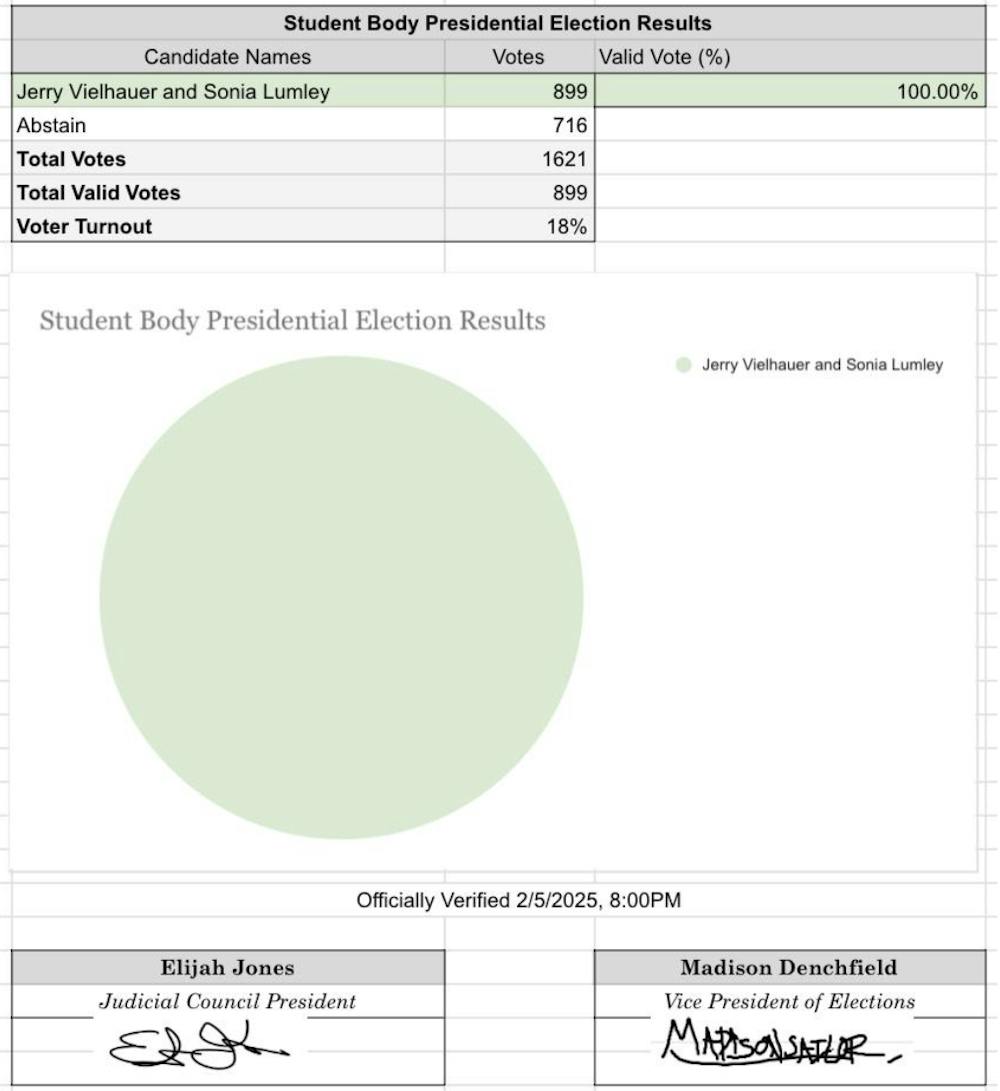The student body president and vice president for the 2025-26 school year were elected last week. Jerry Vielhauer and Sonia Lumley received 55% of the votes cast, while other voters chose to abstain from the election. Per Judicial Council data, turnout stood at 18% of the student body.
My first thought — lackluster. Instead of students participating in the fruits of democracy, the “election” was a coronation. No other ticket mustered the necessary signatures to be on the ballot, possibly due to the lack of access for other candidates compared to Vielhauer and Lumley. The Sorin Fellows GroupMe saw the ticket’s form plopped onto the phones of 500-plus people, speeding up their signature collection process.
Politics are no longer in the air on campus. The 2024 election and ongoing political events have created a rise in palpable apathy over the past few months. Vielhauer and Lumley won, but they will face an uphill battle as students are just less interested in student government than they were at the beginning of the year. More importantly, recent social media posts from the vice president-elect have caused an uproar on campus social media app Fizz, where the nickname “Egonia” has seen rising popularity. This is likely due to a post on her Instagram story perceived as boastful by the student body. The complaints surrounding the electoral process have spread to personal criticism of the duo, though it remains baseless and unwarranted when the problems behind the process remain at large.
It is my hope the president-elect and vice president-elect accomplish their goals. I’d like to see what they can do. However, I find it at best improbable and at worst impossible. Student government is a bureaucratic monster, with more committees than legislative accomplishments over the last year. While the ballad of John Knott and the Hunter Brooke impeachment provided interesting spectacle, they didn’t solve the real problems.
There needs to be a serious reappraisal of what student government is supposed to do. Whatever that job is, they aren’t doing it. I receive a lot of emails. I hear about a lot of meetings. I discover a new committee/subcommittee/planning group/something every week. However, the more I learn, the more this sounds like a prestige pyramid scheme by which people promote one another to more “prestigious” positions to improve their resumes while placing the needs of the student body in the periphery.
I have friends in student government who I know do their best. I’m sure there are others I don’t know who do the same. Yet the reality is this: the system is broken. It’s not any one person’s fault, but it happened. For Vielhauer and Lumley to be effective, they need to fix the system first. This means cutting back on excessive bureaucracy, developing more efficient infrastructure and finding candidates for offices that care about Notre Dame’s student body first and foremost. An increase in transparency on where the money goes would be nice, too.
If it’s not already apparent, I find the whole student government situation unfortunate. The people who serve likely want to be in the actual government one day. This is a perfect microcosm of modern politics: personality over substance, hoarding positions among a small group and an establishment that always ensures its own victory. I don’t want to abolish student government. It needs to, quite literally, “build back better.“ Otherwise, the next congressman, senator or politician from Notre Dame will work with ego rather than the principles of discipline and service at the highest levels of government.
Duncan Stangel is a first-year global affairs major at Notre Dame. Currently residing in Alumni Hall (the center of the universe), he hails from the small town of Cumberland, MD. When he's not saving kittens from trees, you can find him stumbling to Debart with a caffeine source in hand. Contact at dstangel@nd.edu.










